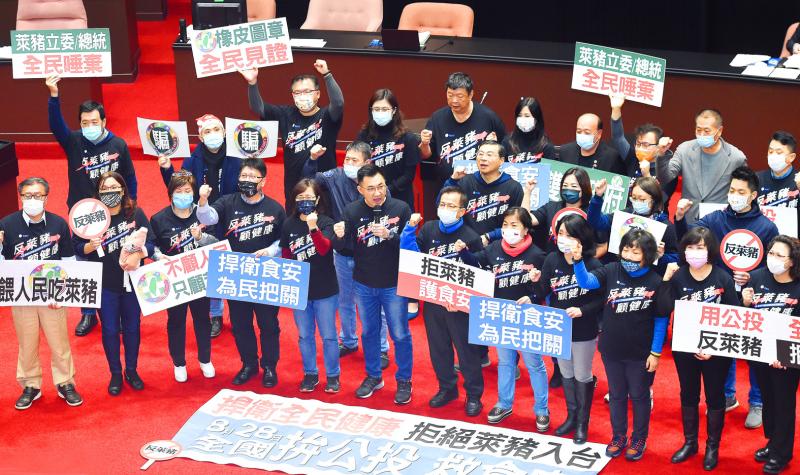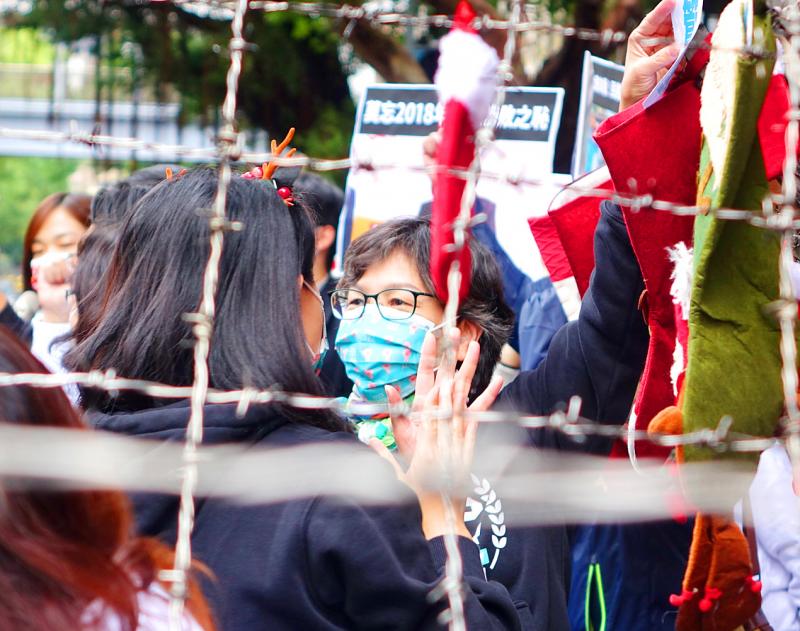Nine administrative directives to lift restrictions on imports of pork products containing ractopamine residue, as well as US beef from cattle 30 months or older, were approved yesterday, with the Democratic Progressive Party (DPP) prevailing, given its majority in the legislature.
The results pave the way for Taiwan to allow imports and sales of such US pork and beef products from Friday next week.
DPP lawmakers, who hold 61 of the 113 seats in the Legislative Yuan, voted to pass the nine directives, which included regulations on ractopamine residue levels; labeling of the origin of pork products; quarantine and examination procedures for imported beef; and rules for imports of US and Canadian beef.

Photo: Liao Chen-huei, Taipei Times
Opposition lawmakers from the Chinese Nationalist Party (KMT) and the Taiwan People’s Party (TPP) voted against the directives.
The New Power Party (NPP) said that it has concerns about public health issues and food safety.
Taiwan Statebuilding Party Legislator Chen Po-wei (陳柏惟) and independent Legislator Freddy Lim (林昶佐) sided with the DPP.

Photo: Wang Yi-sung, Taipei Times
As of press time last night, the legislative session was still ongoing.
Lawmakers were to vote on supplementary bills and amendments to improve controls and evaluations of product labeling, inspections, and enhanced food safety protocols ahead of implementation of the nine directives.
The first directive was to set residue limits for feed additives and supplements on all meat.
The opposition focused on ractopamine, a leanness-enhancing agent for cattle and hogs by some farming operations.
In 2012, the then-KMT administration passed laws for ractopamine levels in imported beef, stipulating a maximum residue level of 0.01 parts per million (ppm).
Lawmakers yesterday approved legislation to permit imports of US pork at the same level.
A ban on the use of ractopamine in domestic farming operations remains in place.
The directives were introduced shortly after President Tsai Ing-wen (蔡英文) on Aug. 28 announced that the government would lift the bans on pork containing ractopamine and beef from cattle more than 30 months old.
Eight of the directives came from the Ministry of Health and Welfare to adjust food safety regulations regarding feed additive and veterinary drug residues, as well as rules for labeling of packaged pork products to show their origin or to indicate that it is for food suppliers.
Another ministry directive was to update quarantine and examination procedures for imported beef.
There were dissenters within the DPP, with legislators Lin Shu-fen (林淑芬), Liu Chien-kuo (劉建國) and Chiang Yung-chang (江永昌) abstaining over amendments to the School Health Act (學校衛生法) and other issues.
They cited reservation over imports of US pork raised by their constituents and local hog farmers.
Over the past few weeks, Lin has expressed doubt that promises of effective management could be kept.
She proposed her own amendments, including stronger labeling and inspection rules, as well as restrictions on such meat being used for school meals.
“If our party punishes me for upholding my principles, I will accept it,” Lin said.
“I am at ease with my stance,” Liu said.
NPP caucus whip Chiu Hsien-chi (邱顯智) said of his party’s defeated proposals: “It is regretful to see our proposed legislation rejected.”
“Even our proposal to increase fines for breaches of the regulations did not pass, depriving the public of the basic right to choose,” Chiu said.
TPP caucus whip Lai Hsiang-ling (賴香伶) said that she was disappointed about the results.
She urged people to use their vote to express their anger.
KMT caucus deputy secretary-general Cheng Li-wun (鄭麗文) said: “DPP legislators have castrated themselves by going against the public will.”
“They are a rubber-stamp team and the party has become a ‘ractopamine pork’ entity,” she said.
Additional reporting by Chen Yun and CNA

SECURITY: As China is ‘reshaping’ Hong Kong’s population, Taiwan must raise the eligibility threshold for applications from Hong Kongers, Chiu Chui-cheng said When Hong Kong and Macau citizens apply for residency in Taiwan, it would be under a new category that includes a “national security observation period,” Mainland Affairs Council (MAC) Minister Chiu Chui-cheng (邱垂正) said yesterday. President William Lai (賴清德) on March 13 announced 17 strategies to counter China’s aggression toward Taiwan, including incorporating national security considerations into the review process for residency applications from Hong Kong and Macau citizens. The situation in Hong Kong is constantly changing, Chiu said to media yesterday on the sidelines of the Taipei Technology Run hosted by the Taipei Neihu Technology Park Development Association. With

A US Marine Corps regiment equipped with Naval Strike Missiles (NSM) is set to participate in the upcoming Balikatan 25 exercise in the Luzon Strait, marking the system’s first-ever deployment in the Philippines. US and Philippine officials have separately confirmed that the Navy Marine Expeditionary Ship Interdiction System (NMESIS) — the mobile launch platform for the Naval Strike Missile — would take part in the joint exercise. The missiles are being deployed to “a strategic first island chain chokepoint” in the waters between Taiwan proper and the Philippines, US-based Naval News reported. “The Luzon Strait and Bashi Channel represent a critical access

‘FORM OF PROTEST’: The German Institute Taipei said it was ‘shocked’ to see Nazi symbolism used in connection with political aims as it condemned the incident Sung Chien-liang (宋建樑), who led efforts to recall Democratic Progressive Party (DPP) Legislator Lee Kun-cheng (李坤城), was released on bail of NT$80,000 yesterday amid an outcry over a Nazi armband he wore to questioning the night before. Sung arrived at the New Taipei City District Prosecutors’ Office for questioning in a recall petition forgery case on Tuesday night wearing a red armband bearing a swastika, carrying a copy of Adolf Hitler’s Mein Kampf and giving a Nazi salute. Sung left the building at 1:15am without the armband and apparently covering the book with a coat. This is a serious international scandal and Chinese

COUNTERINTELLIGENCE TRAINING: The ministry said 87.5 percent of the apprehended Chinese agents were reported by service members they tried to lure into becoming spies Taiwanese organized crime, illegal money lenders, temples and civic groups are complicit in Beijing’s infiltration of the armed forces, the Ministry of National Defense (MND) said in a report yesterday. Retired service members who had been turned to Beijing’s cause mainly relied on those channels to infiltrate the Taiwanese military, according to the report to be submitted to lawmakers ahead of tomorrow’s hearing on Chinese espionage in the military. Chinese intelligence typically used blackmail, Internet-based communications, bribery or debts to loan sharks to leverage active service personnel to do its bidding, it said. China’s main goals are to collect intelligence, and develop a